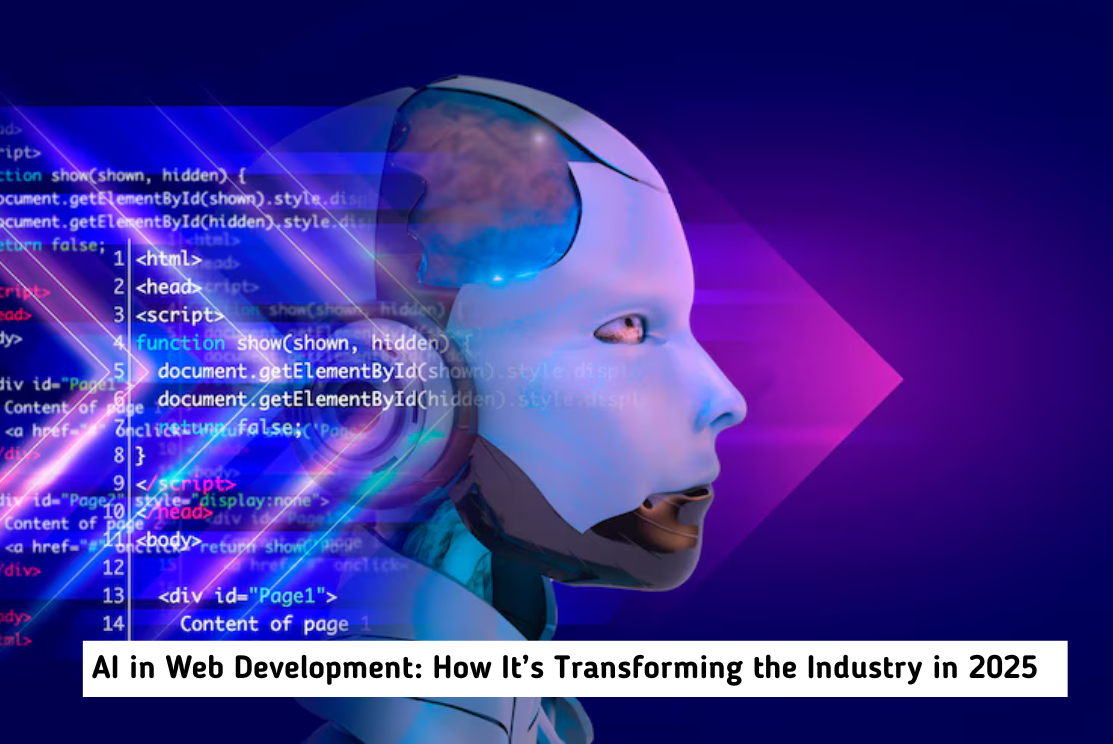The web development landscape is going through a significant transformation in 2025, and the catalyst for this change is artificial intelligence (AI). Whether you are a developer, designer, or digital business owner, AI is becoming an essential part of how websites are created, optimized, and experienced by users.
From generating code and designing interfaces to optimizing SEO and creating personalized user journeys, AI is redefining what it means to build websites. This blog explores how AI is driving innovation in web development, the areas it impacts most, what tools are leading the charge, and how developers can stay ahead.
What is AI-Powered Web Development?
AI-powered web development refers to the use of artificial intelligence technologies like machine learning, natural language processing, and automation to assist or take over specific web development tasks.
This can include:
- Writing and debugging code
- Generating web designs from text prompts
- Automating content creation and SEO
- Personalizing website content for users
- Providing real-time customer support
In short, AI is becoming a digital partner that boosts speed, efficiency, and user experience.

Key Areas Where AI is Changing Web Development
Code Generation and Automation
Developers are increasingly using tools like GitHub Copilot, ChatGPT, and CodeWhisperer to write faster, cleaner code. These AI assistants can suggest functions, autocomplete logic, explain what code does, and even refactor legacy projects.
This automation allows developers to focus more on architecture, performance, and innovation rather than on repetitive or routine coding tasks.
UI and UX Design with AI
Design tools like Figma AI, Uizard, and Framer use AI to convert rough ideas or written prompts into fully designed user interfaces. This shortens the design cycle and enables teams to move from concept to prototype faster.
AI can also predict user behavior and suggest design improvements that align with accessibility and usability best practices.
Content and SEO Optimization
AI tools like Jasper, Copy.ai, and SurferSEO are revolutionizing how content is written and optimized for search engines. From generating landing page copy to creating meta titles and improving keyword density, these tools reduce manual effort while improving content quality and visibility.
This helps developers and marketers align content strategies with SEO from day one.
Personalization at Scale
AI allows websites to adapt dynamically to users based on behavior, preferences, location, and past interactions. From e-commerce product recommendations to personalized blog content, this kind of intelligent automation improves engagement and conversion rates.
Even smaller businesses can now offer personalization without a large development or data science team.
Smarter Chatbots and Support
Customer support has become faster and more responsive with AI-powered chatbots. Tools like Dialogflow, Tidio, and GPT-based chat solutions now provide 24/7 assistance, answer detailed questions, collect leads, and even perform actions such as scheduling appointments or resolving issues.
They integrate easily into websites and offer multilingual support out of the box.
Real-World Use Cases
- Startups are building minimum viable products (MVPs) faster than ever using AI to create code, generate content, and deploy landing pages.
- Agencies are using AI for rapid prototyping, faster design iterations, and automated testing, resulting in more efficient delivery for clients.
- E-commerce platforms are increasing conversion rates with AI-powered product recommendations, dynamic pricing, and intelligent A/B testing.
- Educational websites are integrating AI tutors and support bots to guide learners, answer queries, and personalize learning paths.
Skills Developers Need in 2025
To stay competitive in this new era of AI-enhanced development, professionals should focus on:
- Prompt engineering: Writing effective prompts for AI tools
- API integration: Connecting and using AI models like OpenAI, Hugging Face, and others
- Data handling: Structuring and using data for AI personalization
- Ethical AI use: Understanding privacy, bias, and responsible AI design
- Full-stack fluency: Managing both front-end and back-end logic alongside AI workflows

Trends to Watch
The shift toward AI-first development is accelerating. Here are the major trends shaping web development this year:
- Natural Language-Based Design: Developers and non-coders alike can now create UI layouts using text prompts, reducing dependency on traditional design tools.
- Edge AI Deployment: Platforms like Vercel and Cloudflare enable developers to deploy AI features close to the user, improving response time and performance.
- Headless CMS with AI Integration: Content platforms like Sanity and Strapi are now integrating AI for automatic tagging, content generation, and smart publishing.
- AI Testing and QA: Tools can now run real-time tests, simulate user behavior, and detect bugs before they become critical.
- Accessibility Improvements: AI tools are making websites more inclusive by adjusting layouts, fonts, colors, and navigation for users with disabilities.
Frequently Asked Questions (FAQs)
Will AI replace web developers?
No. AI is a tool to enhance the capabilities of developers, not replace them. It handles repetitive or predictable tasks, while developers remain responsible for architecture, design thinking, and ethical implementation.
Is AI-generated code reliable?
AI-generated code is a useful starting point, but it should always be reviewed and tested by a developer. It may contain logic flaws, security issues, or outdated practices if used blindly.
Can non-developers build websites using AI?
Yes. Platforms like Wix ADI and 10Web allow users to build full websites using simple questions and prompts. However, for advanced functionality and customization, developer skills are still required.
How does AI help with SEO?
AI tools generate optimized titles, meta descriptions, blog posts, and keyword suggestions. They also help identify technical SEO issues and suggest fixes, making SEO faster and more effective.
Are AI chatbots difficult to implement?
Modern chatbot platforms are designed for easy setup. Most offer pre-built templates, drag-and-drop interfaces, and integrations with CMS and CRM systems. Advanced bots can also be powered by GPT APIs with minimal code.
Which development frameworks support AI integrations?
Popular frameworks like React, Next.js, and SvelteKit are ideal for building AI-powered web apps. These can connect to AI APIs for features such as chatbots, content generators, and smart recommendations.

